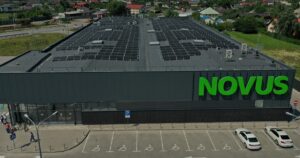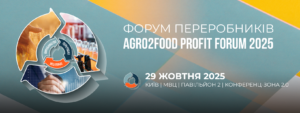
The NOVUS supermarket chain has completed comprehensive preparations for the autumn-winter period to ensure the uninterrupted operation of its stores even in the event of prolonged power outages. The total investment in energy independence and backup solutions amounted to UAH 385 million, according to the company’s press service.
“We realize that the operation of our supermarkets is a matter of Ukrainians’ access to everyday products, even in times of crisis. Therefore, energy independence has become one of the key areas of investment for NOVUS,” the press service quotes Dainius Tumenas, Deputy CEO for Asset Management at NOVUS.
Currently, all NOVUS stores are equipped with generators of various capacities. Their total installed capacity is 33.72 MW, which makes it possible to maintain the network’s operation even during periods of prolonged power outages. The total investment in energy efficiency and energy independence since the start of the full-scale war has reached UAH 385 million, of which UAH 272 million has been allocated to generators.
As noted, one of the breakthrough solutions for Ukrainian retail has been gas generators, which are more environmentally friendly than diesel generators and capable of simultaneously producing electricity, heat, and industrial cooling. The company has installed four units with a total capacity of 3 MW at two of its facilities.
“Gas generators help us remain stable in critical conditions and at the same time move us towards environmental friendliness and energy efficiency,” Tumenas emphasizes.
NOVUS has also formed a strategic reserve of diesel fuel – 168 tons (calculated for six days of autonomous operation of the entire network). In addition, a system of continuous fuel supplies has been established, which allows for a quick response to crisis situations.
At the same time, the company is developing renewable energy. Pilot projects in Novi Petrivtsi (Kyiv region) and at the logistics center have proven the effectiveness of solar panels: in the summer, they covered up to 65% of the supermarket’s energy needs. By the end of 2025, 15 NOVUS facilities will be operating on their own solar power generation with a total capacity of 3.34 MW. The total investment in this area is UAH 78.6 million.
“The future of retail lies in renewable energy sources. This is not only economically beneficial in the long term, but also provides an opportunity to build a more sustainable and responsible business,” explains Tumenas.
To improve energy efficiency in stores, a Building Management System (BMS) is being implemented, which allows remote control of lighting, ventilation, power supply, and other key processes.
An important step in reducing the carbon footprint was the purchase of the first corporate electric vehicles in 2025.
The chain also emphasizes that in the event of power outages, stores remain open not only for shopping but also as a support space where you can recharge your gadgets, warm up, and buy fresh produce.
The Novus supermarket chain is developed by BT Invest (Lithuania), a company founded in 2008 by former Sandora shareholders Raimondas Tumenas and the late Igor Bezzub.
The company is represented in the capital region, Ternopil, and Rivne. As of October 25, the chain has 141 locations (88 Novus, 51 Mi Market neighborhood stores, and two Khapayka discount stores).
According to YouControl, as of October 2025, the owner of Novus Ukraine with a 100% stake in the authorized capital was Consul Trade House CJSC (Vilnius, Lithuania). The ultimate beneficiaries are listed as Marina Poznyakova, Agne Ruzgiene, and Raimondas Tumenas.
According to the company’s financial results, at the end of the first half of 2025, compared to the same period last year, its revenue increased by 21.5% to UAH 16 billion 293.739 million, The company received a net profit of 87.477 million compared to a net profit of 409 million 041 thousand UAH for the first half of 2024.

According to the Serbian Economist, Montenegro is negotiating with the Hungarian low-cost carrier Wizz Air to create an aviation hub in the country, which will allow the launch of up to 20 new international destinations from Podgorica and Tivat.
This was announced by the Minister of Transport and Maritime Affairs of Montenegro, Filip Radulovic, in an interview with Boka News.
According to the minister, the parties are “in the final stage of negotiations” and the final agreement could be signed in the coming weeks.
“The establishment of a Wizz Air hub in Montenegro will be a significant step to increase the country’s transport accessibility and strengthen its position on the European tourist map,” Radulovic said.
Wizz Air is expected to deploy up to three Airbus A320/A321 base aircraft in Podgorica, which will create hundreds of new jobs and increase passenger traffic by 30-40% in the first year of operation. Among the new destinations considered are flights to Italy, Germany, Poland, France, Sweden, Czech Republic, Hungary and the UK, as well as to several cities in the Balkan region.
The Ministry of Transport emphasizes that increasing the number of direct flights will boost tourism and business contacts, as well as expand opportunities for the Montenegrin diaspora and export of local products to EU countries.
“This is not just an aviation project – it is an element of a long-term strategy to turn Montenegro into a regional logistics hub between Central Europe and the Adriatic,” Radulovic said.
According to experts, the opening of Wizz Air hub can increase the number of air passengers in Montenegro from the current 2.3 million to 3 million people per year, as well as attract additional 200-300 thousand foreign tourists annually.
In addition, it will allow the country to strengthen ties with major European capitals and increase the sustainability of the tourist flow, which today is highly dependent on seasonality.
https://t.me/relocationrs/1569

Ukrainian clinics performed 459 organ transplants between January and September 2025.
According to the Ukrainian Transplant Coordination Center (UTCC), the transplants were performed by 25 transplant centers, which performed 274 kidney transplants, 114 liver transplants, and 71 heart transplants.
Currently, there are 4,120 patients on the national waiting list, including 2,512 who need a kidney transplant, 727 who need a liver transplant, 729 who need a heart transplant, 57 for a lung transplant, 19 for a kidney-pancreas transplant, 33 for a split liver transplant, and 43 for a heart-lung transplant.
The top three leaders in organ transplants are the First Medical Association of Lviv (107), the O.O. Shalimov National Scientific Center for Surgery and Transplantology (70), and the Kyiv City Clinical Hospital No. 1 (58).
Heart transplants are performed in eight medical centers in the country, most of them at the Heart Institute of the Ministry of Health of Ukraine (42).
Liver transplants are performed at eight healthcare facilities, with the most being performed at the Oberig Clinic (43).
Kidney transplants are performed at 21 facilities, with the most being performed at the First Medical Association of Lviv (76).
Most transplants (70%) were performed using organs from deceased donors.
The UCTC notes that during the first half of the year, most brain death diagnoses were made in medical institutions in Kyiv (27), Lviv (12), and the Kyiv region (10).
At the same time, according to the UCTC, the number of regions where no brain death diagnoses were made has decreased.
In addition, the UCTC reports that between January and September, 343 bone marrow transplants were performed in 12 transplant centers, 59 of which were performed on children.
The largest number of bone marrow transplants were performed at the Okhmatdyt National Children’s Specialized Hospital (72), the Cherkasy Clinical Oncology Center (63), and the National Cancer Institute (58). In addition, the first bone marrow transplants were performed at City Clinical Hospital No. 4 of the Dnipro City Council.
Detailed statistics can be found on the website of the Ukrainian Transplant Coordination Center.

October 29, 2025, Kyiv, International Exhibition Center (IEC)
Where is the profit during a crisis? How to scale up agricultural processing, attract investment, implement AI, and overcome the shortage of personnel in the food industry?
Experts, entrepreneurs, and leaders of the Ukrainian food sector will provide answers to these questions during the Agro2Food Profit Forum 2025 — the main event of the year for food producers and processors.
The forum will take place on October 29, 2025, in Kyiv, at the International Exhibition Center, as part of the Agro2Food exhibition of technologies, equipment, and solutions for agro-processing and the food industry.
5 panels. 1 day. Maximum practical benefit.
Panel #1. THE ECONOMICS OF ADDED VALUE IN THE FOOD INDUSTRY. Where is the profit in a crisis?
In partnership with the Interfax-Ukraine news agency.
With the participation of representatives of industry associations, clusters, distributors, and owners of processing businesses, who will share real-life cases of development, scaling, and optimization of production.
Key message: To show how Ukrainian producers are finding new sources of profit even in times of turbulence.
Panel No. 2. THE ECONOMICS OF INVESTMENT AND EUROPEAN INTEGRATION
In partnership with the Reform Support Team (RST) of the Ministry of Economy of Ukraine and ProConsalting. With the participation of a representative of Oschadbank (on agribusiness support programs), the owner of an agricultural processing company (with a scaling case study), and a supplier of processing equipment (on technological innovations).
Key message: How to attract investment during wartime, develop exports, and implement sustainability strategies?
Key topics:
Panel No. 3. ECONOMY OF INNOVATION. “Digitalization. AI. Food processing”
In partnership with the Ukrainian Food Manufacturers Association U-Food and the Ukrainian Cluster Alliance.
Key message: Artificial intelligence is already changing the Ukrainian food industry.
Key topics:
Panel No. 4. HUMAN RESOURCE ECONOMICS. Labor shortage in the food industry: challenges and solutions.
In partnership with the Job Platform for Food Technologists and Manufacturers and Odessa National Technological University.
With the participation of American University Kyiv.
Key topics:
Panel No. 5. THE ECONOMICS OF UNIQUENESS
Main message: Innovative products, intellectual property, and craftsmanship as a profit strategy.
Key topics:
Agro2Food Profit Forum 2025 is:
Agro2Food statistics.
At the exhibition venue, which will reach 4,000 m2, over 120 exhibitors will present all the key achievements in agricultural processing and the food industry.
Organizer:
Premier Expo:
Where and when:
October 29, 2025
International Exhibition Center (IEC), Kyiv
More about the program: https://agro2food.com.ua/program/profit-forum
Media contact:
Olena Zhoga, Conference Manager, Premier Expo
+380 (67) 789 27 09
Agro2Food — Building an economy of added value together.
See you at the main event of the sincere Ukrainian autumn!
Tickets for the exhibition: https://agro2food.com.ua/visitors/registration
Interfax-Ukraine — information partner
Source: https://interfax.com.ua/news/press-release/1112280.html

On October 17, 2025, ProAgro Group will hold the fourth Ukrainian Livestock Summit (Ukrainian Livestock Summit 2025) in Kyiv, a leading industry platform for discussing current trends and prospects for the development of livestock farming, poultry farming, livestock product processing, and feed production, writes SEEDS.
Among the speakers at the summit will be Oksana Yurchenko, coordinator of animal health and food safety projects at the FAO Investment Center and representative of the educational platform AgriAcademy, who will present an analytical report on “Livestock farming in Ukraine: trends, challenges, and prospects.”
Oksana Yurchenko will present an overview of key trends in the livestock industry, including issues of staff shortages, the transformation of agricultural professions, the sector’s adaptation to the requirements of European integration, and the role of modern informal education in training a new generation of agribusiness specialists.
“Today, the livestock industry is facing a number of serious challenges, one of the key ones being an acute shortage of qualified personnel. Companies are actively looking for specialists, but it is becoming increasingly difficult to find them, while a new generation of farmers with a completely different vision and approach to work is entering the market. That is why it is extremely important to integrate distance learning into the daily activities of farms, making it an integral part of the production process. AgriAcademy is an effective tool that will motivate employees and help improve their professional level,” emphasizes Oksana Yurchenko.
During the summit, a promotional video about AgriAcademy will also be shown, highlighting the opportunities offered by certified free online education for farmers. The platform currently offers more than 30 practical courses, created in collaboration with leading universities around the world, companies in the agricultural sector, and industry experts in Ukraine.
Oksana Yurchenko’s presentation is intended not only to assess the state of the livestock sector, but also to show how modern educational initiatives contribute to strengthening the human resources potential of Ukrainian agribusiness in the context of post-war recovery and European integration.
This is a free online learning platform created on the initiative of the EBRD as part of its food security support program in Ukraine. Its goal is to strengthen the competitiveness and sustainable development of agriculture, which has suffered significant losses due to the war.
The platform’s creation and management (including course development, training tours, etc.) is supported and funded by the EBRD, as well as:
AgriAcademy, ANALYTICS, livestock farming, market review, ProAgro Group, Ukrainian Livestock Summit 2025

A program has been developed in Kyiv for reserve energy supply and protection of the most important second-level facilities (requiring reinforced concrete protection). A total of UAH 3.7 billion has been allocated for such shelters, of which UAH 2.7 billion has already been allocated to the Agency for Restoration under the Ministry of Infrastructure, which is responsible for the work, Kyiv Mayor Vitali Klitschko said on Monday.
“After completing the construction of first-level protection, which was approved by a commission with the participation of the State Special Communications Service, we developed a program for backup power supply and protection of the most important second-level facilities. (These are the facilities over which reinforced concrete shelters are being built. I would like to note that the Agency for Restoration under the Ministry of Infrastructure was responsible for the construction of concrete shelters). The capital has allocated a total of UAH 3.7 billion for such shelters and has already spent UAH 2.7 billion of this amount. In other words, the financial resources are secured, but the city had to implement the program on its own. And Kyiv is doing it,” he wrote on Telegram before the meeting of the Kyiv Defense Council.
The mayor emphasized that all measures were carried out in accordance with the requirements of the General Staff of the Armed Forces of Ukraine.
Klitschko stressed the inadmissibility of bringing issues of the security of Ukraine’s energy system into the public domain.
“It was the City Defense Council that approved and adopted decisions on protective measures. After all, its representatives have the relevant competence, experience, and professional approach (the Council, I remind you, includes representatives of the Armed Forces, the State Emergency Service, the Security Service, the Ministry of Internal Affairs, the Prosecutor’s Office, and other structures),” the mayor of Kyiv noted. “In my opinion, in wartime, this approach is justified and effective: the military and security forces must set clear guidelines for security. Any other format, where the issue of the security of Ukraine’s energy system is brought into the public domain and the opinions of amateurs are disseminated as expert opinions, causes significant damage to the issue of defense. In particular, to the image of the air defense forces,” Klitschko said.